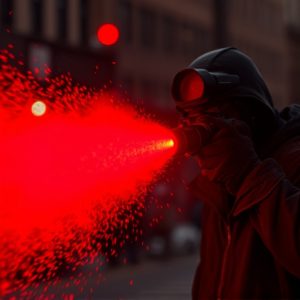Deciphering Pepper Spray’s Impact on Vision and Its Potential for Induced Temporal Blindness
Pepper spray contains capsaicinoid, which upon contact with eyes causes immediate intense pain, pro…….
Pepper spray contains capsaicinoid, which upon contact with eyes causes immediate intense pain, profuse tearing, redness, and significant vision impairment. While it does not lead to permanent blindness, the effects can be so severe that they temporarily render a person unable to see, leading to disorientation and difficulty navigating. The impact on vision is strategic, as the spray aims to incapacitate by disrupting visual abilities. It's important for both law enforcement and civilians to understand these effects to use pepper spray safely and effectively in self-defense situations. Proper knowledge about its temporary effects on ocular health can prevent unintended severe consequences. To clarify, while pepper spray can cause temporary blindness, it does not result in permanent vision loss and the effects are reversible with appropriate care post-exposure.
Exploring the potency of pepper spray, this article sheds light on its profound effects, particularly on vision and physiological responses. Often questioned for its ability to temporarily incapacitate, understanding the extent to which it can impair sight—addressed in “Can Pepper Spray Blind You?”—is crucial for both users and those potentially affected by its use. We delve into the science behind the sting, examining the impact on visual perception and the broader physiological reactions it triggers. Join us as we explore these effects in detail, ensuring a comprehensive grasp of pepper spray’s potential to induce temporary blindness and other related side effects.
Understanding the Impact of Pepper Spray on Vision
Exposure to pepper spray can cause a range of effects on the eyes, which are often immediate and debilitating. The active ingredient in pepper sprays, capsaicinoid, is responsible for inducing intense irritation upon contact with the mucous membranes, including those in the eyes. When pepper spray comes into contact with the eyes, it triggers a cascade of physiological responses. The eyes may become red and watery as the lacrimal glands produce an excess of tears in an attempt to flush out the irritant. The pain is so severe that it can temporarily impair vision, making it difficult to see. In some instances, the effects can be intense enough to significantly reduce visual acuity, which can lead to disorientation and difficulty navigating one’s surroundings. It’s a common misconception whether pepper spray can permanently blind someone; while it is unlikely to cause permanent blindness, the intense burning sensation and temporary vision loss can be profound and long-lasting enough to hinder an individual’s ability to see clearly for a considerable period post-exposure. Understanding the impact of pepper spray on vision is crucial for both law enforcement and civilians who may use it as a means of self-defense. Knowledge about the potential effects can aid in the safe handling and application of such a potent irritant.
The Physiological Effects of Pepper Spray and Potential for Temporary Blindness
Exposure to pepper spray, a commonly used non-lethal self-defense tool, induces a range of immediate and potent physiological effects. The active ingredient in most formulations is capsaicin, derived from chili peppers, which triggers a fiery sensation upon contact with mucous membranes and skin. Upon application, pepper spray causes intense pain and irritation in the eyes, skin, and respiratory system. The eyes, being particularly vulnerable to the spray’s effects, become highly sensitive to light and can lead to temporary blindness within seconds of exposure. This occurs due to the spray’s particles obstructing the tear ducts, preventing effective washing away of the irritant. The resulting inflammation swells the eyelids shut, severely impairing vision for a period that can range from minutes to half an hour or more, depending on various factors such as wind conditions and the individual’s physiology. The effects are designed to incapacitate by disrupting the attacker’s ability to see, which can provide a critical window of opportunity for escape or for law enforcement intervention. It is important to note that while pepper spray can cause temporary blindness, it does not result in permanent vision loss; the effects are reversible once the individual is removed from the contaminated area and properly washed with water. Understanding these physiological impacts is crucial for both personal safety strategies and for legal and ethical considerations regarding its use.


